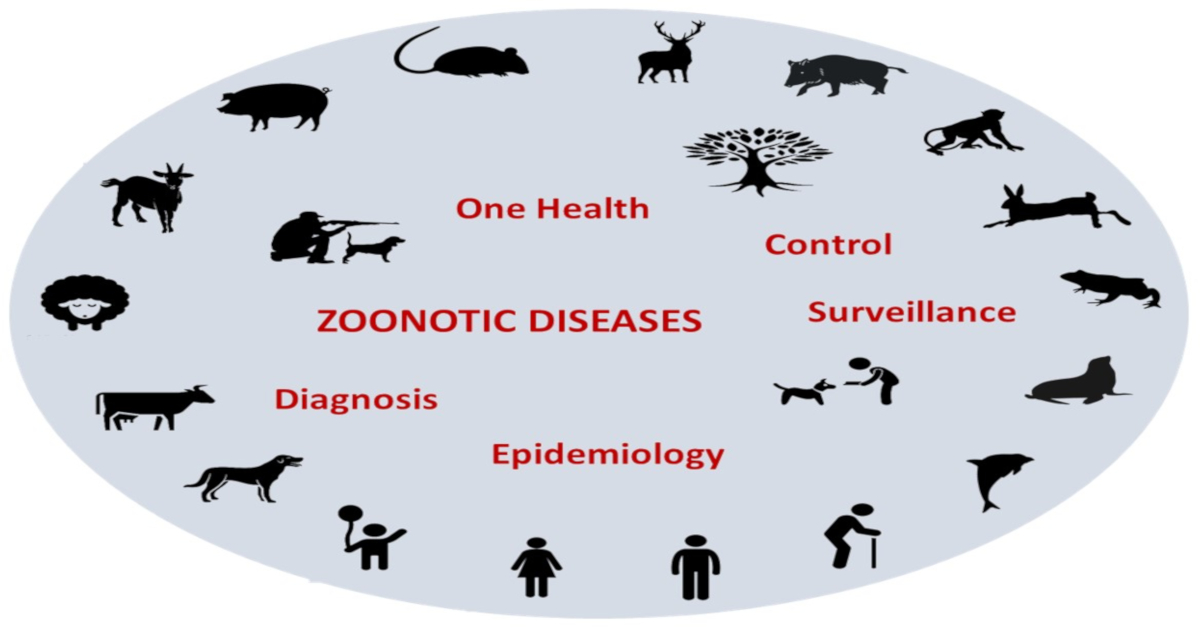- 2.7Impact Factor
- 5.2CiteScore
- 18 daysTime to First Decision
Zoonotic Diseases: Etiology, Diagnosis, Surveillance and Epidemiology
Special Issue Information
Dear Colleagues,
Zoonotic diseases have diverse etiologies, with various pathogens, such as viruses, bacteria, parasites, and fungi, capable of causing infections in both animals and humans. It is estimated that 60% of emerging infectious diseases globally reported are zoonoses, making their control a priority. Efficient multisectoral surveillance as well as accurate and timely diagnoses are essential for controling zoonotic diseases, reducing their impact. Advanced diagnostic tools, including next-generation sequencing, are increasingly being employed to enhance the precision and speed of zoonotic disease diagnosis and epidemiology. Intersectoral surveillance involves monitoring both animal and human populations, as well as environments, to identify potential threats and patterns of transmission. Understanding the epidemiology of zoonotic diseases involves studying the patterns, causes, and effects of these diseases within populations. Addressing the challenges posed by zoonotic diseases requires a multidisciplinary approach that spans human, animal, and environmental health. Etiological insights, accurate diagnostic tools, robust integrated surveillance systems, and a thorough understanding of epidemiological patterns are all essential components of effective prevention and control strategies for zoonotic diseases.
This Special Issue aims to contribute to the advancement of knowledge regarding the etiology, diagnosis, surveillance, and epidemiology of zoonotic diseases in both domestic and wild animals. The focus is on fostering a deeper understanding of these aspects to inform effective prevention and control strategies.
We invite researchers to submit original research papers and reviews that cover, but are not limited to, the following topics:
Etiology of zoonotic diseases:
• Identification and characterization of zoonotic pathogens.
• Molecular mechanisms underlying cross-species transmission.
• Investigation of reservoir hosts and intermediate hosts.
Diagnostic tools and techniques:
• Advancements in diagnostic methods for zoonotic diseases.
• Application of next-generation sequencing in enhancing diagnostic precision.
• Case studies on successful diagnostic approaches.
Surveillance systems:
• Development of robust surveillance strategies for monitoring animal and human populations.
• Integration of technology and data analytics in surveillance.
• Comparative analyses of surveillance systems across regions.
Epidemiological patterns:
• Studies on the patterns, causes, and effects of zoonotic diseases within populations.
• Modeling and analysis of epidemiological trends.
• Impact of environmental factors on disease dynamics.
Dr. Ana Cristina Ferreira
Dr. Sandra Cavaco
Guest Editors
Manuscript Submission Information
Manuscripts should be submitted online at www.mdpi.com by registering and logging in to this website. Once you are registered, click here to go to the submission form. Manuscripts can be submitted until the deadline. All submissions that pass pre-check are peer-reviewed. Accepted papers will be published continuously in the journal (as soon as accepted) and will be listed together on the special issue website. Research articles, review articles as well as short communications are invited. For planned papers, a title and short abstract (about 250 words) can be sent to the Editorial Office for assessment.
Submitted manuscripts should not have been published previously, nor be under consideration for publication elsewhere (except conference proceedings papers). All manuscripts are thoroughly refereed through a single-blind peer-review process. A guide for authors and other relevant information for submission of manuscripts is available on the Instructions for Authors page. Animals is an international peer-reviewed open access semimonthly journal published by MDPI.
Please visit the Instructions for Authors page before submitting a manuscript. The Article Processing Charge (APC) for publication in this open access journal is 2400 CHF (Swiss Francs). Submitted papers should be well formatted and use good English. Authors may use MDPI's English editing service prior to publication or during author revisions.
Keywords
- animal health
- diagnostic
- epidemiology
- one health
- surveillance
- zoonotic diseases

Benefits of Publishing in a Special Issue
- Ease of navigation: Grouping papers by topic helps scholars navigate broad scope journals more efficiently.
- Greater discoverability: Special Issues support the reach and impact of scientific research. Articles in Special Issues are more discoverable and cited more frequently.
- Expansion of research network: Special Issues facilitate connections among authors, fostering scientific collaborations.
- External promotion: Articles in Special Issues are often promoted through the journal's social media, increasing their visibility.
- Reprint: MDPI Books provides the opportunity to republish successful Special Issues in book format, both online and in print.


